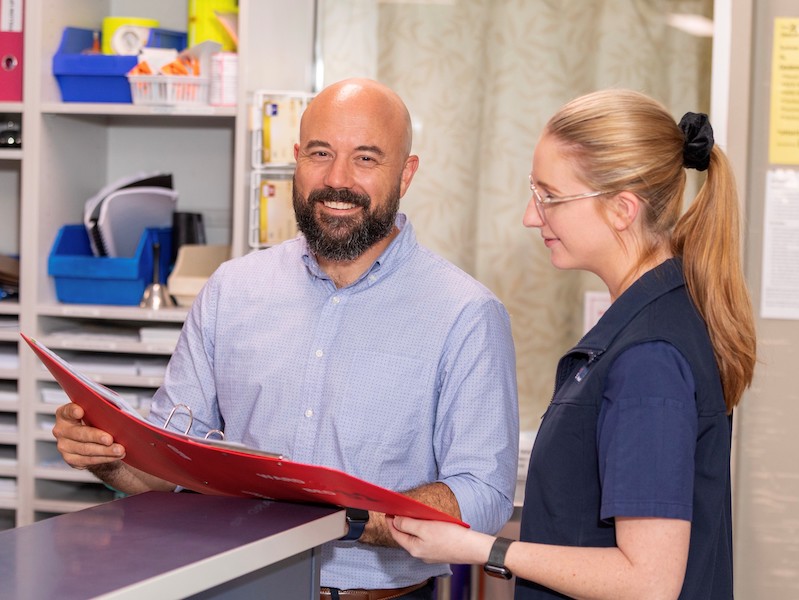Researcher Highlights
Cultivating better health using the science of change
Ben Britton
A Conjoint Lecturer with the School of Medicine and Public Health, Dr Ben Britton focuses on improving health; by identifying behavioural motivators, then designing and evaluating interventions to create positive change.

A Senior Clinical and Health psychologist, Ben divides his working week into three days of clinical practice and two of research, thanks to a Hunter Cancer Research Alliance Fellowship. Starting as an intern at the Calvary Mater, Ben is now stationed at John Hunter Hospital where he is part of the Liaison Psychiatry Team.
Working in a clinical capacity across every ward has enabled Ben to form research collaborations with teams looking after oncology, diabetes, cystic fibrosis, heart disease and cardiac rehab, transgender health, medicinal cannabis, and staff support during the coronavirus pandemic.
Ensconced within the framework of a functioning hospital, Ben is uniquely situated to recognise any disconnects between research theory and practice, as well as pre-empt patient and health worker response to impending interventions.
“In the hospital, I see how things actually run, who actually does the work and where they do it. So sometimes my role is designing clinical interventions that will actually work in a real-world setting, and sometimes I end up taking more of a facilitator role for other researchers, implementing their interventions.”
Optimising quality of life for oncology patients
The bulk of Ben’s research has been in the area of oncology, with collaborations often developing organically with other clinicians and researchers he interacts with.
Whether assessing the efficacy of distress screening; understanding the effects of depression and anxiety on patient help seeking; evaluating diet and comorbidity interventions, or addressing procedural anxiety, Ben’s research has one thing in common - it is all directly translational.
“The research has to change clinical practice. Either just because people now know they should be doing something differently, or by actually helping them do it differently. That's what I am always looking for, ways of identifying and solving clinical problems.”
In 2013, he headed up an NHMRC funded multi-centre trial of an intervention he developed to prevent malnutrition in patients with head and neck cancers undergoing radiotherapy by using psychological strategies.
A collaboration with the Trans-Tasman Radiation Oncology Group, the trial trained existing dietitians in hospitals in Brisbane, Melbourne, Adelaide and Perth. The trial not only saw significant cost reductions for the health system, but demonstrated a significant improvement in nutritional status, reduced weight loss and improved quality of life for head and neck oncology patients involved.
Improving outcomes
An expert generalist, Ben stresses his great admiration for researchers who deep dive into very particular and complex challenges to improve patient outcomes.
He shows equal regard for the health care workers who implement and coordinate resultant treatments, as well as the patients battling to maintain their wellbeing.
It is this appreciation of different perspectives within the health care system that drives Ben to do all he can to ensure therapies are as effective as possible. And it is in the context of these differences that the science of behavioural change comes into play.
Ben points out that there can be a disconnect between the researchers delivering therapies, the health workers delivering care, and the patients expected to alter their behaviours.
“Often treatments would work better if people did things differently,” Ben says.
“Sometimes the people needing to change are the patients, sometimes they're the staff, and sometimes they are the institutions delivering the care.”
Working on the why
As illnesses are becoming more chronic, health systems are expecting patients to take on more of the burden of care than ever before. This means the health behaviour change interventions themselves, plus the delivery of such, need to be of optimal efficiency and efficacy to save lives.
Improving the skills of clinicians to change the patient's behaviour, through developing resources and training for staff, or the delivery of multi-site trials, improves outcomes for everyone.
“We send patients home, saying you need to apply this ointment or take this drug or do these exercises or whatever. Forever. And there's very little emphasis on how we actually get patients to do that stuff. And then we just start blaming them, they come back into the hospital and we say well, they didn't wear their masks, or they didn't take the medication properly,” he says.
“OK, they didn't, but what did we do to make that happen? There's a science to getting people to do stuff, but it feels like that's ignored at times. If we focus more on why people do things instead of what they have to do, maybe we could have better outcomes for everyone.”
The University of Newcastle acknowledges the traditional custodians of the lands within our footprint areas: Awabakal, Darkinjung, Biripai, Worimi, Wonnarua, and Eora Nations. We also pay respect to the wisdom of our Elders past and present.
